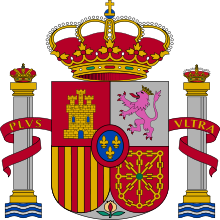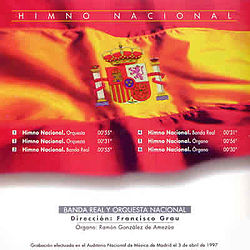- Marcha Real
-
La marcha real English: The Royal March 
The Coat of arms of Spain.
National anthem of
 Spain
Spain
Lyrics None Music Unknown Adopted 1770 Music sample La marcha real ("The Royal March") is the national anthem of Spain. It is one of the few national anthems in the world to have no official lyrics (together with Bosnia and Herzegovina and Kosovo).
The anthem, one of the oldest in the world, was composed by Frederick the Great of Prussia[citation needed].(This march was used in Holland as bugle call, almost 100 years before he was born) The melody was first printed in a document dated 1761 and entitled Libro de Ordenanza de los toques militares de la Infantería Española (The Spanish Infantry's Book of Military Bugle and Fife Calls), by Manuel de Espinosa. Here it is entitled La Marcha Granadera ("March of the Grenadiers"), although no composer's name is given.
In 1770, King Charles III declared the Marcha Granadera to be the official "Honour March" for the Sovereigns and the Royal Family, as it was played at public and ceremonial events, and because it was always played at public events attended by the royal family, Spaniards soon came to regard the Marcha Granadera as their national anthem and called it the Marcha Real, or "Royal March".
Under the Second Spanish Republic (1931–1939), El Himno de Riego replaced La Marcha Real as the national anthem of Spain. At the conclusion of the Civil War, however, Francisco Franco restored La Marcha Real as the country's national anthem, under its old title of La Marcha Granadera.
Contents
Current version
The current official version, as described in Royal Decree 1560/1997,[1] is a sixteen-bar long phrase, divided in two sections, each one is made up of four repeated bars (AABB form). Tempo is set to ♩= 76 and key to B flat.
There is a short version without the repetitions that is used depending on the occasion when the anthem is performed. The long one is kept for the King, while the short must be performed to the Prime Minister, the Prince, or in sport.
There are also three official performances by a symphony orchestra, a military band, and an organ, written by Francisco Grau Vegara and requested by the Government of Spain. All in all, there are six different official adaptations. They all were recorded by the Spanish National Orchestra and the Royal Band as an official recording and released on compact disc for a limited period of time.[2]
Copyright issues
As the harmonization of the Marcha Real was written by Bartolomé Pérez Casas in the early 1900s, the copyright has not yet expired. The government bought it from Pérez Casas' estate in 1997 for 130,000,000 pesetas (~ € 781,316) to avoid future legal problems.[3] Until it expires, the copyright belongs to the Spanish Ministry of Culture, and collecting societies charge copyright fees, which has led to criticism.[4]
As a result, many different harmonizations are performed to avoid paying. Nonetheless, the rights to the 1997 Francisco Grau revision were transferred to the government at no charge, although they were not placed in the public domain.[5]
Lyrics
Though the Marcha Real has no lyrics, words have been written and used for it in the past. One version was used during Alfonso XIII's reign and another during General Franco's dictatorship; however, none of them was ever made official. The national anthem has been played without words since 1978, when the lyrics that had been approved by General Francisco Franco were abandoned.[6]
Lyric competition
After witnessing a rendition of "You'll Never Walk Alone" at Anfield in 2007, the President of the Spanish Olympic Committee, Alejandro Blanco, said he felt inspired to seek lyrics to La Marcha Real ahead of Madrid's bid to host the 2016 Olympic Games.[7][8] Politicians, including the PM José Luis Rodríguez Zapatero, steered clear of the issue in order not to alienate some Basques, Catalans, or Galicians who tend to identify with their own regions rather than with the Spanish state.[9] A number of the autonomous communities of Spain have their own anthems. An open competition for the lyrics resulted in 7,000 entries.[10] On January 16, 2008, just five days after presenting the competition winner to the public, the Spanish Olympic Committee withdrew the proposal after widespread public criticism due to the lyrics' supposed nationalist tone.[11]
Interpretation and etiquette
Military bands of the Spanish Armed Forces and the Cuerpo Nacional de Policia and civilian Marching bands and Concert bands play an A-major version of the anthem adapted for wind bands.
The bugle call "To the Colors" in Spain is the version played by Bugle bands in Spanish churches in religious occasions and processions organized by civil groups and the parishes. Various versions adapted for the drum and the bugle are used, even though brass instruments play the anthem as well. But in some bugle bands, the B flat version of the anthem (the official one, adapted for the bugle) is played.
Being the National Anthem, and in honor of the King and Queen of Spain, it's a common practice for all to stand once it is played. Even though it is also played in church events, respect for the King and Queen (and the Royal Family as well) is required by everyone in attendance.
References
- ^ Boletín Oficial del Estado Royal Decree 1560/1997.
- ^ Official anthem release album cover.
- ^ Boletín Oficial del Estado Royal Decree 1543/1997.
- ^ "El himno da aún mucho dinero". Crónica. #604. May 27, 2007.
"Cuando el himno es de un particular". Periodista Digital. May 27, 2007. - ^ Boletín Oficial del Estado Royal Decree 2027/1998.
- ^ Divisive national anthem lyrics ditched Wed Jan 16, 2008
- ^ Liverpool fans help inspire Spain to write words to anthem Reuters, 5 June 2007
- ^ Spain to add lyrics to wordless national anthem MSNBC, 26 June 2007
- ^ "Lost for Words", The Economist, Vol 384 Number 8539.
- ^ "Spain: Lyrics for Anthem Pulled". Associated Press. January 18, 2008. http://www.nytimes.com/2008/01/18/world/europe/18briefs-anthem.html?ref=world. Retrieved 2011-01-13.
- ^ "Controversy over lyrics stalls Placido Domingo's dream of singing Spanish anthem". International Herald Tribune. 16 January 2008. http://www.iht.com/articles/ap/2008/01/16/europe/EU-GEN-Spain-Anthem-Controversy-Domingo.php. Retrieved on 17 January 2008.
Sheet music
External links
- The National Anthem (Prime Minister's Office site)
- 2008 Spanish National Anthem Lyrics in English and in Spanish
- MIDI File
- MP3 version by the US Navy Band
- UNAMU - The "Union Nacional de Antiguos Oficiales y Suboficiales de las Milicias Universitarias" has a website about the anthem, with a complete instrumental version.
- English translation of the proposed new lyrics
National anthems of Europe National anthems
of sovereign statesAlbania · Andorra · Armenia · Austria · Azerbaijan · Belarus · Belgium · Bosnia and Herzegovina · Bulgaria · Croatia · Cyprus · Czech Republic · Denmark · Estonia · Finland · France · Georgia · Germany · Greece · Hungary · Iceland · Ireland · Italy · Kazakhstan · Latvia · Liechtenstein · Lithuania · Luxembourg · Macedonia · Malta · Moldova · Monaco · Montenegro · Netherlands · Norway · Poland · Portugal · Romania · Russia · San Marino · Serbia · Slovakia · Slovenia · Spain · Sweden · Switzerland · Turkey · Ukraine · United Kingdom · Vatican City
National and regional
anthems of other
political entitiesAbkhazia (disputed) · Adygea (Russia) · Åland (Finland) · Asturias (Spain) · Bashkortostan (Russia) · Basque Country (Spain) · Bavaria (Germany) · Brittany (France) · Catalonia (Spain) · Chechen Republic (Russia) · Dagestan Republic (Russia) · Cornwall (UK) · Corsica (France) · Crimea (Ukraine) · England (UK) · Faroe Islands (Denmark) · Flanders (Belgium) · Friesland (Netherlands) · Gibraltar (UK) · Greenland (Denmark) · Guernsey · Istria (Croatia) · Northern Ireland (UK) · Jersey · Republic of Karelia (Russia) · Komi Republic (Russia) · Kosovo (disputed) · Lincolnshire (UK) · Lusatia (Germany) · Macedonia (Greece) · Isle of Man · Mari El (Russia) · Mordovia (Russia) · Nagorno-Karabakh (disputed) · North Ossetia-Alania (Russia) · Republika Srpska (Bosnia and Herzegovina) · Sami · Scotland (UK) · South Ossetia (disputed) · Svalbard (Norway) · Tatarstan (Russia) · Transnistria (disputed) · Northern Cyprus (disputed) · Tuva (Russia) · Udmurtia (Russia) · Valencia (Spain) · Wales (UK) · Wallonia (Belgium) · Yorkshire (UK)
Anthems of former
political entitiesAlsace (German Empire) · German Democratic Republic (East Germany) · Soviet Union (1944-1991) · SFR Yugoslavia (1977-1991) · FR Yugoslavia (1992-2003) · Serbia and Montenegro (2003-2006) Second Spanish Republic (1931-1939)
Anthem of
European Union and
Council of EuropeComplete List · Africa · Asia · Europe · North America · Oceania and the Pacific Islands · South AmericaCategories:- Royal anthems
- National anthems
- Spanish songs
- National symbols of Spain
Wikimedia Foundation. 2010.

